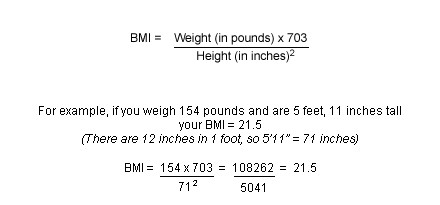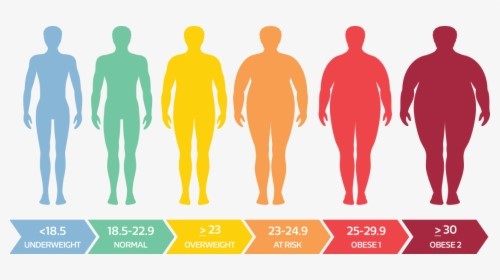BMI is a ratio of a person’s height and weight, and does not directly measure a person’s health status, muscle, bone, body fat, or body water. A high BMI in combination with poor eating habits and lack of exercise can mean that a person is at risk for health-related problems such as high blood pressure and diabetes. A low BMI in combination with decreased food intake or skipping meals and snacks can mean that a person is at risk for health-related problems such as a compromised immune system and malnutrition.
How is BMI measured?
BMI is a mathematical calculation of your weight (in pounds) times 703 divided by your height (in inches) squared. You can figure out your BMI on your own using this formula: BMI = Weight (in pounds) x 703 divided by Height (in inches) squared.


What does my BMI mean?
If you’re under the age of 20, once your health care provider calculates your BMI, they use a growth chart to convert this number into a percentile that is based on your age and sex. Your percentile at one age compared to your percentile at younger ages tells you how you have been growing since birth. Your health care provider can tell you if your BMI percentile falls into the underweight, normal weight, overweight or obese category which may not be an appropriate indicator of health status.
No matter what your BMI percentile is, it’s important to ask if it has changed over the last couple of years. Although BMI can change when you’re growing or going through puberty, teens should ideally stay at about the same BMI percentile during their teen years. If your BMI percentile changes a lot either up or down, you should talk to your health care provider about possible reasons for the change. For people 20 years and older, healthy ranges do not differ by age or sex and are no longer given in percentiles.
What is a BMI report card and what is it used for?
Some schools in the United States are checking weights and heights of students at school, calculating BMI, and sending this information home to parents as a BMI report card. If you or your parents receive a BMI report card, it is important that you talk with a health care provider or registered dietitian who can explain what the numbers mean.
What if my BMI is high?
Talk to your health care provider about whether you should be concerned about your BMI. Keep in mind that BMI is just an estimate of body size and is not a good indicator of overall health. This is true for muscular individuals (especially those who exercise or are very athletic). Their weight may be higher because of extra “muscle mass” and not because of extra body fat, and BMI doesn’t consider how much muscle someone has.
What if my BMI is too low?
Talk to your health care provider about whether you should be concerned about a low BMI percentile. They will likely look at your growth chart to see if you have been following roughly the same percentile as you have grown, or whether the percentile has dropped. Having a BMI classification of underweight can put you at risk for health complications such as a weakened immune system. It might also mean that you are missing out on key nutrients in your dietary intake.
If your BMI is falls in the underweight, overweight, or obese category, you should see your health care provider. He/she can check to see if your lifestyle habits put you at risk for getting any serious health problems and can refer you to a registered dietitian to make sure you are getting all the nutrients you need.


Accommodations available upon request. Please contact 815-802-9400 Option 3 for more information.